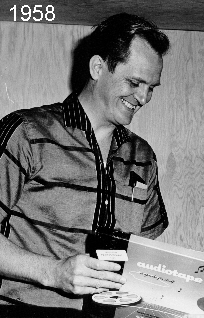William B. Meeks Jr., had enthusiasm and the right kind of smile. Armed with those two assets, he could sell almost anyone on his latest creative concepts. Sometimes those ideas were a bit too unusual to catch on. But far more often they became part of radio stations in every corner of the world. Bill spent 27 years running PAMS Productions, and in the process aided the creation of legendary jingle packages and commercials. He also helped to create the entire station ID jingle industry which, like Bill, made Dallas it's permanent home.
 Bill was born in 1921 and had an early interest
in music. In those early days of radio, stations were expected
to air live performances. The playing of "canned music"
(records) was frowned upon. At the age of 14 Bill was already
part of a band that played a weekly radio show on WRR Dallas.
Later, he played with the Early Bird Orchestra on WFAA. It was
in 1947 that Gordon McLendon opened a new Dallas station named
KLIF. He hired Bill and his band to perform live.
Bill was born in 1921 and had an early interest
in music. In those early days of radio, stations were expected
to air live performances. The playing of "canned music"
(records) was frowned upon. At the age of 14 Bill was already
part of a band that played a weekly radio show on WRR Dallas.
Later, he played with the Early Bird Orchestra on WFAA. It was
in 1947 that Gordon McLendon opened a new Dallas station named
KLIF. He hired Bill and his band to perform live.
It was not uncommon for artists performing on the air to promote their show's sponsors by doing advertising jingles for them. Someone had the idea of promoting the radio station in a similar way. So in the midst of recording little songs about everything from car dealers to pawn shops, jingles for KLIF were also created. They helped people remember the name of this new station in a catchy and musical way.
Bill worked on the air and also sold radio time. He often created jingles for some of the clients he sold time to. Eventually he decided to devote all his time to advertising, and in 1951 he started his own company: PAMS Advertising Agency, Inc. For several years PAMS created and placed spots for a variety of clients. There were a few station jingles done during this period, but it wasn't until the mid-50s that individual cuts were assembled into packages that could be syndicated to stations all over the country. After the success of the first few PAMS jingle series, the company's focus slowly shifted to providing exciting ID's to the ever growing number of top-40 radio stations. By the end of 1964, PAMS' primary business had become station jingles, and the name of the company was shortened to PAMS, Inc.
Because Bill Meeks was always looking for new sounds and unique ideas, PAMS is credited with a long list of firsts including the variable logo, Sonovox, and use of the Moog synthesizer. Bill assembled a team of top-notch writers, arrangers, musicians, singers, and engineers. By constantly challenging them with offbeat ideas, the company's product remained fresh and unpredictable for over two decades.
 Financial and business problems caused PAMS
to cease operations in 1978, but Bill continued to pursue musical
projects on his own. He created several production music libraries,
and returned to his roots by becoming a one-man advertising agency
and production house for several local retail chains. He never
lost his interest in the physics of sound, and always tried to
produce the unusual. In July 1999 he told me "I'm 78 years
old and I still don't know what I'm going to do when I retire."
Financial and business problems caused PAMS
to cease operations in 1978, but Bill continued to pursue musical
projects on his own. He created several production music libraries,
and returned to his roots by becoming a one-man advertising agency
and production house for several local retail chains. He never
lost his interest in the physics of sound, and always tried to
produce the unusual. In July 1999 he told me "I'm 78 years
old and I still don't know what I'm going to do when I retire."
Not all of his ideas worked, and not all his ventures were financially successful. But many of them touched the lives of millions of radio listeners, even though most outside of the industry don't know his name. Bill Meeks lost his battle against cancer on September 8, 1999. He is survived by his wife Marge, two children and six grandchildren.
-Jonathan Wolfert